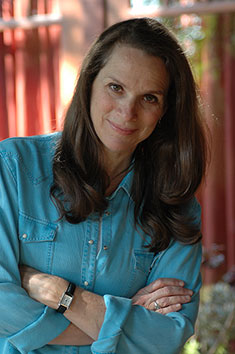Says Carrie Fisher, who wrote "Postcards From the Edge": "As a human being, she's really funny. But you haven't seen that in most of her work. Right now, I think, it's about coming closer to home for her."
Adds the comedienne Tracey Ullman: "I called her up to ask her if I should talk to you. And I asked her what I should say when you ask about her comedic talents. She said I should just pause and say, 'What comedic talents?' " A Connoisseur of Comic Women
What tickles Ms. Streep's funny bone most these days is the work of the tough-chick comediennes. "I like the ones who aren't afraid or so concerned with being girlish and attractive. Yeah, I like Sandra Bernhard and Roseanne Barr because of the tougher stance. I like that it doesn't bow to being appealing and can still be funny."
None of which could possibly explain Ms. Streep in "Defending Your Life," in which she plays the quintessential "girl" role, passive and pretty and muted and wise -- the straight woman to Mr. Brooks's funny man. Ask about her contribution to the film and, looking somewhat embarrassed, she says it was "lighter than air." Ask about her technique in playing Mr. Brooks's dream girl, and she cracks, "It's very important to have good hair." Ask about the resonance of her character, and she says there was none.
"I know Albert feels he's written a whole woman, a completely full-blown person," she says. "I didn't know how to break it to him, he's really not done that. He's written an idea of a woman. And I did my best to fill those silver slippers.
"But it was also fun," she adds. "I thought, 'Ah, the hell with it. You're dead. You can do whatever you want.' " A Careerist with a Twist
During the course of this interview, Ms. Streep emotes countless heavy sighs, a sign of her distaste for sitting still with a journalist. Her ambivalence is palpable. She worries about projecting a "starlet" persona, but at the same time has chosen to meet in a suite that the movie studio reserved at the Hotel Bel-Air, a swank establishment with its swans, lush gardens and pink facade.
"I just never figure out this stuff," she says, referring to her film choices, "except in an interview, because I'm not an analytical person and I basically take jobs that appeal to me for whatever the skewed reason is that they appeal to me. I'm not in analysis, and nobody asks me these questions at home.
"I mean, at this moment in my life, most of my day is spent with some guy who wants to know where to put the second toilet upstairs. That's what I'm thinking about. I'm not thinking about acting."
And yet, Ms. Streep is also a shrewd careerist who is as ambitious as any actor in Hollywood. When asked how she feels about Madonna getting the role of "Evita," a part for which Ms. Streep studied for more than a year before negotiations fell apart, she replies: "I could rip her throat out. I can sing better than she can, if that counts for anything."
The loss of that role, which she says was a "bitter disappointment," resulted in her being without a job and deciding to do an American Express Card commercial with children from one of her daughters' schools. "I don't believe in the company," she says. "But I have a card, so I felt like I could kill two birds with one stone because my daughter's school was in financial trouble. They got an enormous contribution from American Express, and I gave them one. So, it was good."
For now, at least during the remainder of her pregnancy, Ms. Streep is doing off-camera work, narrating Phil Joanou's American version of Michael Apted's "7 Up," a documentary that follows the lives of 7-year-olds, with sequels every seven years.
Though she says she would like to return to the theater one day, Ms. Streep claims to have developed a case of stage fright that has grown "way out of proportion," because she feels "followed by the expectation of what I've done." So she misses the feeling of an audience, the roar of approval. "And that is something I was conscious about in picking those comedies," she says, " 'cause I like hearing a crew laugh." Is Meryl Streep funny?
She's deadly serious when discussing the question, and her awareness of how sober she is is endearing, if not actually funny. She launches into a thoughtful response about how being comical is part of a bigger package, a spectrum of feeling. Then, she says, "I think I'm funny -- and overanxious -- and lazy."
This last part hardly seems possible. Meryl Streep, lazy person? "Oh, yeah. I'm very, very lazy. If there's a choice, I'd rather not do it, you know what I mean?"
Since "Defending Your Life" is about death, it seems appropriate to ask about her feelings about an afterlife.
"Oy," she bellows, as if some large object has fallen on her head. "Oy, oy. I believe there's some point where it all is clear. I mean, I've been with people who were dying," she says (she lived and worked with the actor John Cazale, who died of bone cancer in 1978), "and seeing that moment and seeing peace come. I do believe that. But I don't see it as a sort of corporate building, like Albert." One minute she's a crackup; the next, quite pensive. "The other day," she says, "I thought, 'Boy, I'm ready to do something that takes a pound of flesh again.' " So much for Meryl Streep's craving for comedy.
published in The New York Times



